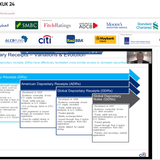Following Argentina’s highly successful return to the international capital markets in April, other non-sovereign entities have begun to tap the markets.
The province of Neuquen earlier in the month issued a US$235mn 12 year bond. Demand for the bond reached US$1.5bn, allowing the lead managers, JP Morgan and Deutsche Bank to tighten pricing by 80bp to 8.625%. The bond was still 162.5bp wide of the sovereign curve.
The sub-sovereign will soon be joined by other provinces looking to tap the international capital markets.
The province of Mendoza has mandated Citigroup and Credit Suisse to begin a roadshow as it looks to access US dollar funding. It is looking to raise US$300mn in both local and foreign funds to refinance existing debt. Mendoza is rated B2 by Moody’s and B- by S&P Global Ratings.
Chubut province is readying the sale of a fixed rate US$83mn bond that would be due in 2023 and is rated B3 by Moody’s.
Cordoba and Buenos Aires are also looking to come to the markets in the near future. The latter of the two had already issued a US$1.25bn bond before Argentina’s government tapped the markets, and is rated Caa2 by Moody’s and B- by both S&P Global Ratings and Fitch.
The sub-sovereigns are likely to be followed by a number of Argentine FIs and corporates. Banco Hipotecario has mandated Bank of America Merrill Lynch and Itau on a reissue of its 9.75% 2020 notes with a minimum size of US$100mn. The reissue carries a rating of B3 from Moody’s and B- from S&P Global Ratings.
Joe Bormann, Managing Director of Latin American Corporate Ratings at Fitch said that throughout the year there will be increasing activity on the corporate side. Corporates are likely to offer the most attractive investment opportunities as they are generally the least leveraged entities in Argentina.
“The fact that many of the country’s corporates have had to maintain very strong balance sheets in order to simply survive foreign exchange controls and the inability to access the international capital markets have made them attractive for investors who want to hold solid credit with good business growth,” Bormann stated.
The performance of Argentine corporates is currently much better than the performance of other corporates in neighbouring countries, which could help them soak up additional regional liquidity.
As Bormann noted, the higher performance of Argentine corporates can be attributed to the fact that they have traditionally been very cautious with their investment plans due to political and economic uncertainty, which has led them to protect their balance sheets.
The average net debt to the EBITDA ratio over the past 5 years has increased from 2.9 to 3.5 in Brazil and from 2.4 to 4.0 in Chile. In Argentina however, it has remained steady at around 2.5 over the same period, demonstrating the strong financial position of the country’s corporates relative to their neighbouring peers.
“Ratings for Argentine corporates will only go up, unlike the corporates of other nations in the region, where Fitch holds a negative outlook on 1 out of 4 ratings,” Bormann said.
He added that Fitch was generally rating corporates 1 or 2 notches above the sovereign, an anomaly amongst most ratings of a sovereign and its corporates. Argentina is currently rated B3 by Moody’s, B- by S&P Global Ratings and B by Fitch.









